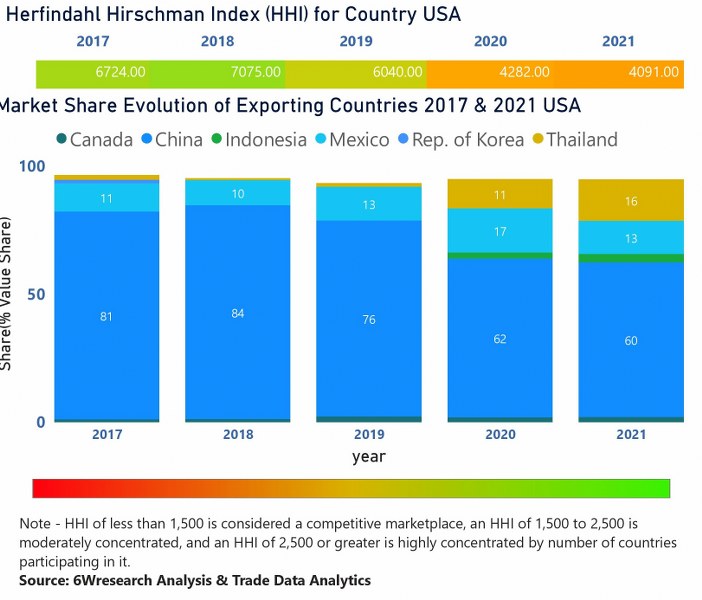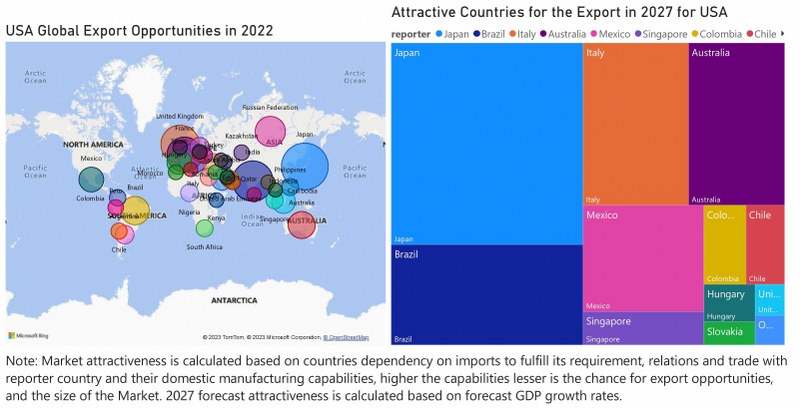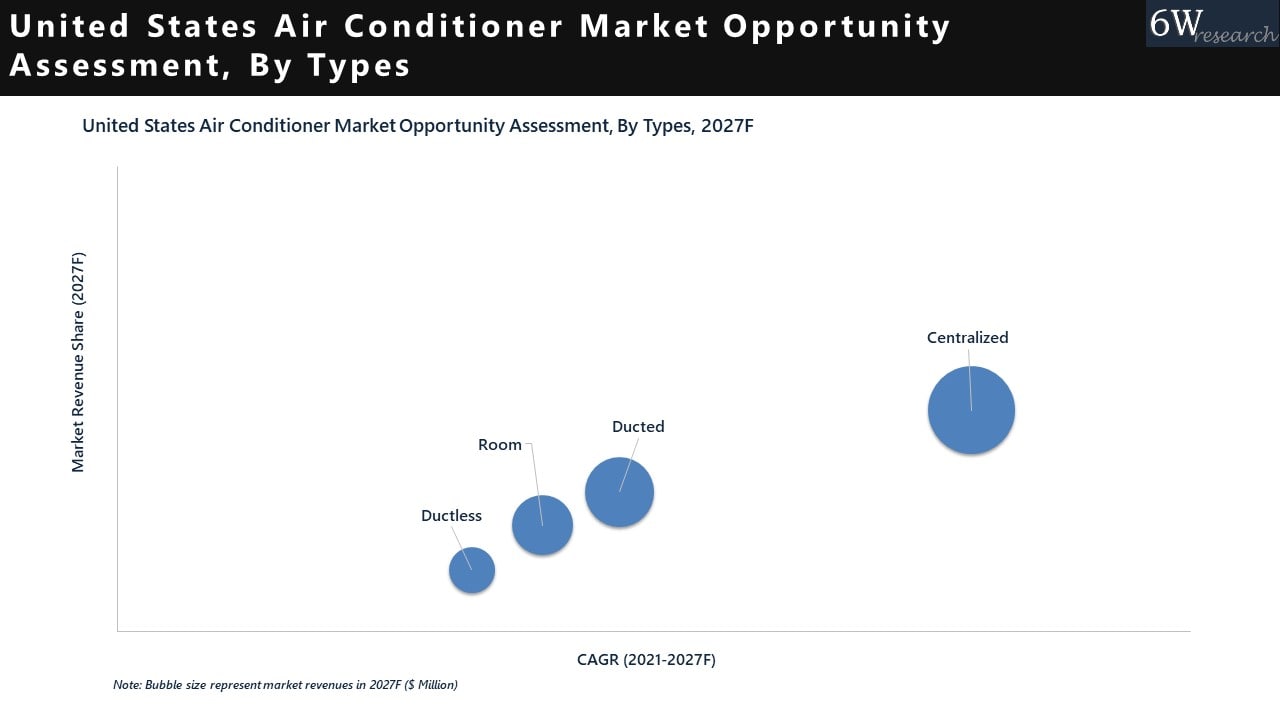US Air Conditioner Market (2025-2031) | Analysis, Size, Share, Revenue, Growth, Industry, Forecast, Trends, Outlook
Market Forecast By Type (Room Air Conditioner, Ducted Air Conditioner, Ductless Air Conditioner, Centralized Air Conditioner), By Application (Residential, Healthcare, Commercial & Retail, Transportation & Infrastructure, Hospitality, Others) And Competitive Landscape
| Product Code: ETC090060 | Publication Date: Dec 2023 | Updated Date: Jan 2025 | Product Type: Report | |
| Publisher: 6Wresearch | No. of Pages: 70 | No. of Figures: 35 | No. of Tables: 3 | |
Topics Covered in the United States (US) Air Conditioner (AC) Market
United States (US) Air Conditioner (AC) Market report thoroughly covers the market by type and by application. The market outlook report provides an unbiased and detailed analysis of the ongoing market trends, opportunities/high growth areas, and market drivers which would help the stakeholders to devise and align their market strategies according to the current and future market dynamics.
United States (US) Air Conditioner (AC) Market Synopsis
The United States air conditioner market has been substantially growing, influenced by various factors such as climate variations, high population growth and technological advancements. Key trends include a growing demand for energy efficiency, and increasing awareness of environmental sustainability. Also, the changing lifestyle has increased demand for smart air conditioners that can be controlled remotely through smartphones. These ongoing developments have burgeoned the United States Air Conditioner (AC) Market revenue in the upcoming years.
According to 6Wresearch, the United States (US) Air Conditioner (AC) Market size is estimated to grow at a CAGR of 6.4% during the forecast period 2025-2031. United States Air Conditioner (AC) Market is surging in the country underpinned by several ongoing latest developments & factors are high temperatures and changes in climate patterns. Furthermore, due to high competition in the market companies have started developing advanced technology air conditioners for efficient performance. Additionally, the rising energy-efficient regulations by the government encourage manufacturers to produce energy-efficient air conditioning systems for better environmental conditions. Moreover, post-COVID-19 people have become more aware of indoor air quality, this has changed customers’ preferences towards the adoption of better air filtration air conditioners. The United States air conditioner industry is facing some challenges such as increased energy efficiency regulations, supply chain disruptions affecting component availability, and growing environmental concerns influencing consumer preferences towards sustainable options. The market has seen a growing emphasis on energy efficiency, smart technology integration, and environmentally friendly refrigerants. Ductless mini-split systems and smart thermostats gained popularity for their energy-saving features and convenience. Additionally, there was an increasing demand for systems with better air quality features, such as advanced filtration
Government Initiatives introduced in the United States (US) Air Conditioner (AC) Market
The governments have implemented various measures to promote energy efficiency and environmental sustainability in the HVAC (Heating, Ventilation, and Air Conditioning) sector. These initiatives often include energy efficiency standards, tax incentives, and rebate programs to encourage consumers and businesses to adopt more energy-efficient and environmentally friendly air conditioning systems. Additionally, some states may have specific regulations or programs aimed at reducing the environmental impact of air conditioning technologies.
Key Players in the United States (US) Air Conditioner (AC) Market
Some key players are operating in the United States air conditioner market seamlessly included companies like Carrier, Trane Technologies, Lennox International, Daikin, and Johnson Controls. These companies are offering high quality electronics to their customers that are equipped with advanced technology.
Market Analysis by Type
According to Dhaval, Research Manager, 6Wresearch, ductless air conditioners have been securing significant growth in the United States owing to their energy efficiency, flexibility, and ease of installation.
Market Analysis by Application
Based on the application, the residential and commercial sectors have been contributing to the growth of the air conditioner market in the country. The residential sector tends to show consistent and high demand owing to new constructions and replacements.
Key attractiveness of the report
- 10 Years Market Numbers.
- Historical Data Starting from 2021 to 2024.
- Base Year: 2024.
- Forecast Data until 2031.
- Key Performance Indicators Impacting the Market.
- Major Upcoming Developments and Projects.
Key Highlights of the Report:
- United States (US) Air Conditioner Market Outlook
- Market Size of United States (US) Air Conditioner Market, 2024
- Forecast of United States (US) Air Conditioner Market, 2031
- Historical Data and Forecast of United States (US) Air Conditioner Revenues & Volume for the Period 2021 - 2031
- United States (US) Air Conditioner Market Trend Evolution
- United States (US) Air Conditioner Market Drivers and Challenges
- United States (US) Air Conditioner Price Trends
- United States (US) Air Conditioner Porter's Five Forces
- United States (US) Air Conditioner Industry Life Cycle
- Historical Data and Forecast of United States (US) Air Conditioner Market Revenues & Volume By Type for the Period 2021 - 2031
- Historical Data and Forecast of United States (US) Air Conditioner Market Revenues & Volume By Room Air Conditioner for the Period 2021 - 2031
- Historical Data and Forecast of United States (US) Air Conditioner Market Revenues & Volume By Ducted Air Conditioner for the Period 2021 - 2031
- Historical Data and Forecast of United States (US) Air Conditioner Market Revenues & Volume By Ductless Air Conditioner for the Period 2021 - 2031
- Historical Data and Forecast of United States (US) Air Conditioner Market Revenues & Volume By Centralized Air Conditioner for the Period 2021 - 2031
- Historical Data and Forecast of United States (US) Air Conditioner Market Revenues & Volume By Application for the Period 2021 - 2031
- Historical Data and Forecast of United States (US) Air Conditioner Market Revenues & Volume By Residential for the Period 2021 - 2031
- Historical Data and Forecast of United States (US) Air Conditioner Market Revenues & Volume By Healthcare for the Period 2021 - 2031
- Historical Data and Forecast of United States (US) Air Conditioner Market Revenues & Volume By Commercial & Retail for the Period 2021 - 2031
- Historical Data and Forecast of United States (US) Air Conditioner Market Revenues & Volume By Transportation & Infrastructure for the Period 2021 - 2031
- Historical Data and Forecast of United States (US) Air Conditioner Market Revenues & Volume By Hospitality for the Period 2021 - 2031
- Historical Data and Forecast of United States (US) Air Conditioner Market Revenues & Volume By Others for the Period 2021 - 2031
- United States (US) Air Conditioner Import Export Trade Statistics
- Market Opportunity Assessment By Type
- Market Opportunity Assessment By Application
- United States (US) Air Conditioner Top Companies Market Share
- United States (US) Air Conditioner Competitive Benchmarking By Technical and Operational Parameters
- United States (US) Air Conditioner Company Profiles
- United States (US) Air Conditioner Key Strategic Recommendations
Market Covered
The report offers a comprehensive study of the subsequent market segments:
By Type
- Room Air Conditioner
- Ducted Air Conditioner
- Ductless Air Conditioner
- Centralized Air Conditioner
By Application
- Residential
- Healthcare
- Commercial & Retail
- Transportation & Infrastructure
- Hospitality
- Others
US Air Conditioner Market (2025-2031) : FAQs
| 1 Executive Summary |
| 2 Introduction |
| 2.1 Key Highlights of the Report |
| 2.2 Report Description |
| 2.3 Market Scope & Segmentation |
| 2.4 Research Methodology |
| 2.5 Assumptions |
| 3 United States (US) Air Conditioner Market Overview |
| 3.1 United States (US) Country Macro Economic Indicators |
| 3.2 United States (US) Air Conditioner Market Revenues & Volume, 2021 & 2031F |
| 3.3 United States (US) Air Conditioner Market - Industry Life Cycle |
| 3.4 United States (US) Air Conditioner Market - Porter's Five Forces |
| 3.5 United States (US) Air Conditioner Market Revenues & Volume Share, By Type, 2021& 2031F |
| 3.6 United States (US) Air Conditioner Market Revenues & Volume Share, By Application, 2021 & 2031F |
| 4 United States (US) Air Conditioner Market Dynamics |
| 4.1 Impact Analysis |
| 4.2 Market Drivers |
| 4.3 Market Restraints |
| 5 United States (US) Air Conditioner Market Trends |
| 6 United States (US) Air Conditioner Market, By Types |
| 6.1 United States (US) Air Conditioner Market, By Type |
| 6.1.1 Overview and Analysis |
| 6.1.2 United States (US) Air Conditioner Market Revenues & Volume, By Type, 2021 - 2031F |
| 6.1.3 United States (US) Air Conditioner Market Revenues & Volume, By Room Air Conditioner, 2021 - 2031F |
| 6.1.4 United States (US) Air Conditioner Market Revenues & Volume, By Ducted Air Conditioner, 2021 - 2031F |
| 6.1.5 United States (US) Air Conditioner Market Revenues & Volume, By Ductless Air Conditioner, 2021 - 2031F |
| 6.1.6 United States (US) Air Conditioner Market Revenues & Volume, By Centralized Air Conditioner, 2021 - 2031F |
| 6.2 United States (US) Air Conditioner Market, By Application |
| 6.2.1 Overview and Analysis |
| 6.2.2 United States (US) Air Conditioner Market Revenues & Volume, By Residential, 2021 - 2031F |
| 6.2.3 United States (US) Air Conditioner Market Revenues & Volume, By Healthcare, 2021 - 2031F |
| 6.2.4 United States (US) Air Conditioner Market Revenues & Volume, By Commercial & Retail, 2021 - 2031F |
| 6.2.5 United States (US) Air Conditioner Market Revenues & Volume, By Transportation & Infrastructure, 2021 - 2031F |
| 6.2.6 United States (US) Air Conditioner Market Revenues & Volume, By Hospitality, 2021 - 2031F |
| 6.2.7 United States (US) Air Conditioner Market Revenues & Volume, By Others, 2021 - 2031F |
| 7 United States (US) Air Conditioner Market Import-Export Trade Statistics |
| 7.1 United States (US) Air Conditioner Market Export to Major Countries |
| 7.2 United States (US) Air Conditioner Market Imports from Major Countries |
| 8 United States (US) Air Conditioner Market Key Performance Indicators |
| 9 United States (US) Air Conditioner Market - Opportunity Assessment |
| 9.1 United States (US) Air Conditioner Market Opportunity Assessment, By Type, 2021& 2031F |
| 9.2 United States (US) Air Conditioner Market Opportunity Assessment, By Application, 2021 & 2031F |
| 10 United States (US) Air Conditioner Market - Competitive Landscape |
| 10.1 United States (US) Air Conditioner Market Revenue Share, By Companies, 2024 |
| 10.2 United States (US) Air Conditioner Market Competitive Benchmarking, By Operating and Technical Parameters |
| 11 Company Profiles |
| 12 Recommendations |
| 13 Disclaimer |
Market Forecast By Type (Room Air Conditioner, Ducted Air Conditioner, Ductless Air Conditioner, Centralized Air Conditioner), By Application (Residential, Healthcare, Commercial & Retail, Transportation & Infrastructure, Hospitality, Others) And Competitive Landscape
| Product Code: ETC090060 | Publication Date: Aug 2021 | Product Type: Market Research Report | |
| Publisher: 6Wresearch | No. of Pages: 70 | No. of Figures: 35 | No. of Tables: 5 |
US Air Conditioner (AC) Market | Country-Wise Share and Competition Analysis
In the year 2021, China was the largest exporter in terms of value, followed by Thailand. It has registered a growth of 26.14% over the previous year. While Thailand registered a growth of 84.23% over the previous year. While in 2017 China was the largest exporter followed by Mexico. In terms of the Herfindahl Index, which measures the competitiveness of countries exporting, the USA has Herfindahl index of 6724 in 2017 which signifies high concentration while in 2021 it registered a Herfindahl index of 4091 which signifies high concentration in the market
 US Air Conditioner (AC) Market - Export Market Opportunities
US Air Conditioner (AC) Market - Export Market Opportunities

Latest (2023) Development in the United States Air Conditioner (AC) Market
United States Air Conditioner (AC) Market is surging in the country underpinned by several ongoing latest developments & factors are high temperatures and changes in climate patterns. Furthermore, due to high competition in the market companies have started developing advanced technology air conditioners for efficient performance. Additionally, the rising energy-efficient regulations by the government encourage manufacturers to produce energy-efficient air conditioning systems for better environmental conditions. Moreover, post-COVID-19 people have become more aware of indoor air quality, this has changed customers’ preferences towards the adoption of better air filtration air conditioners. Also, the changing lifestyle has increased demand for smart air conditioners that can be controlled remotely through smartphones. These ongoing developments have burgeoned the United States Air Conditioner (AC) Market revenue in the upcoming years.
Topics Covered in the United States (US) Air Conditioner (AC) Market
United States (US) Air Conditioner (AC) Market is projected to grow over the coming years. The United States (US) Air Conditioner (AC) Market report is a part of our periodical regional publication North America Air Conditioner (AC) Market Outlook Report. 6W tracks the air conditioner market for over 60 countries with individual country-wise market opportunity assessments and publishes the report titled Global Air Conditioner (AC) Market outlook report annually.
United States (US) Air conditioner (AC) Market report comprehensively covers the market type and application. The market report provides an unbiased and detailed analysis of the ongoing market trends, opportunities, high growth areas, and market drivers, which would help the stakeholders to devise and align their market strategies according to the current and future market dynamics.
United States Air Conditioner Market Synopsis
The United States Air Conditioner Market is anticipated to project substantial growth during the upcoming period on account of an increasing number of commercial investments, especially in urban areas is propelling the growth of the US Air Conditioner Market. Also, the setting up of various institutions, offices, shopping complexes and malls is leading to the development of the market. Increasing investment by the public and private sectors is fueling the Air Conditioner Market in the US.
According to 6Wresearch, the United States (US) Air Conditioner (AC) Market size is projected to grow at a CAGR of 6.1% during 2021-2027. The United States occupies 1st position in terms of the market size in the North America Air Conditioner Market. Unfavourable weather conditions along with soaring temperatures beholds an upsurge in the growth of the market. Moreover, a massive surge in the construction sector coupled with rising investment by the public and private sectors adds to the development of the market. However, the market experienced a major setback on account of COVID-19 backed by the shutting down of retail stores and manufacturing units hampering the supply chain of the market. The US Air conditioner market growth was also hampered by the restriction on the movement of goods.
COVID-19 Impact on the United States (US) Air Conditioner (AC) Market
The COVID-19 pandemic had a profound impact on the United States' Air Conditioner (AC) market. The closure of all the offline ACs stores was caused by the government's strict pandemic lockdown measures, including, restrictions on trade due to curb the COVID-19 prevalence, this led to an interruption in the product supply chain & raw materials and affected the manufacturing process. With the reduction in the ACs demand had affected the United States (US) Air Conditioner (AC) industry during the COVID-19 pandemic.
Market Analysis by Type
In terms of market by types, Centralized Air Conditioner dominates the market and is expected to remain in a dominant position in the coming years with the fastest growth rate among all types.

Market Analysis by Application
In terms of application, Commercial & Retail dominates the market and is expected to remain in a dominant position in the coming years. However, Hospitality is expected to have the fastest growth rate among all applications.
Key Attractiveness of the Report
- COVID-19 Impact on the Market.
- 10 Years Market Numbers.
- Historical Data Starting from 2017 to 2020.
- Base Year: 2020
- Forecast Data until 2027.
- Key Performance Indicators Impacting the Market.
- Major Upcoming Developments and Projects.
Key Highlights of the Report:
- United States (US) Air Conditioner Market Outlook
- Market Size of United States (US) Air Conditioner Market, 2020
- Forecast of United States (US) Air Conditioner Market, 2027
- Historical Data and Forecast of United States (US) Air Conditioner Revenues & Volume for the Period 2017 - 2027
- United States (US) Air Conditioner Market Trend Evolution
- United States (US) Air Conditioner Market Drivers and Challenges
- United States (US) Air Conditioner Price Trends
- United States (US) Air Conditioner Porter's Five Forces
- United States (US) Air Conditioner Industry Life Cycle
- Historical Data and Forecast of United States (US) Air Conditioner Market Revenues & Volume By Type for the Period 2017 - 2027
- Historical Data and Forecast of United States (US) Air Conditioner Market Revenues & Volume By Room Air Conditioner for the Period 2017 - 2027
- Historical Data and Forecast of United States (US) Air Conditioner Market Revenues & Volume By Ducted Air Conditioner for the Period 2017 - 2027
- Historical Data and Forecast of United States (US) Air Conditioner Market Revenues & Volume By Ductless Air Conditioner for the Period 2017 - 2027
- Historical Data and Forecast of United States (US) Air Conditioner Market Revenues & Volume By Centralized Air Conditioner for the Period 2017 - 2027
- Historical Data and Forecast of United States (US) Air Conditioner Market Revenues & Volume By Application for the Period 2017 - 2027
- Historical Data and Forecast of United States (US) Air Conditioner Market Revenues & Volume By Residential for the Period 2017 - 2027
- Historical Data and Forecast of United States (US) Air Conditioner Market Revenues & Volume By Healthcare for the Period 2017 - 2027
- Historical Data and Forecast of United States (US) Air Conditioner Market Revenues & Volume By Commercial & Retail for the Period 2017 - 2027
- Historical Data and Forecast of United States (US) Air Conditioner Market Revenues & Volume By Transportation & Infrastructure for the Period 2017 - 2027
- Historical Data and Forecast of United States (US) Air Conditioner Market Revenues & Volume By Hospitality for the Period 2017 - 2027
- Historical Data and Forecast of United States (US) Air Conditioner Market Revenues & Volume By Others for the Period 2017 - 2027
- United States (US) Air Conditioner Import Export Trade Statistics
- Market Opportunity Assessment By Type
- Market Opportunity Assessment By Application
- United States (US) Air Conditioner Top Companies Market Share
- United States (US) Air Conditioner Competitive Benchmarking By Technical and Operational Parameters
- United States (US) Air Conditioner Company Profiles
- United States (US) Air Conditioner Key Strategic Recommendations
Market Segmentation:
The report provides a detailed analysis of the following market segments:
By Types:
- Room Air Conditioner
- Ducted Air Conditioner
- Ductless Air Conditioner
- Centralized Air Conditioner
By Application:
- Residential
- Commercial & Retail
- Healthcare
- Hospitality
- Transportation & Infrastructure
- Others
- Single User License$ 1,995
- Department License$ 2,400
- Site License$ 3,120
- Global License$ 3,795
Search
Related Reports
- Middle East OLED Market (2025-2031) | Outlook, Forecast, Revenue, Growth, Companies, Analysis, Industry, Share, Trends, Value & Size
- Tajikistan Thermal Camera Market (2025-2031) | Trends, Size, Growth, Share, Industry, Companies, Value, Analysis, Revenue, Forecast & Outlook
- Singapore Professional AV Market (2025-2031) | Industry, Size, Growth, Revenue, Value, Companies, Forecast, Analysis, Share & Trends
- Saudi Arabia Genset Market (2025-2031) | Industry, Size, Growth, Revenue, Value, Companies, Forecast, Analysis, Share & Trends
- India OOH Advertising Market (2025-2031) | Industry, Size, Growth, Revenue, Value, Companies, Forecast, Analysis, Share & Trends
- Vietnam Twisted Pair Cables Market (2024-2030) | Size & Revenue, Forecast, Share, Companies, Competitive Landscape, Analysis, Trends, Value, Segmentation, Outlook, Industry, Growth
- South Africa B2B Cleaning Market (2025-2031) | Size & Revenue, Forecast, Share, Companies, Competitive Landscape, Analysis, Trends, Value, Segmentation, Outlook, Industry, Growth
- Mexico Dispersion Market (2025-2031) | Industry, Size, Growth, Revenue, Value, Companies, Forecast, Analysis, Share & Trends
- United States Video Conferencing Market (2025-2031) | Outlook, Industry, Size, Revenue, Share, Trends, Forecast, Growth, Companies, Analysis & Value
- Australia Electric Motor Market (2025-2031) | Trends, Share, Size, Value, Revenue, Industry, Growth, Analysis, Segmentation & Outlook
Industry Events and Analyst Meet
Our Clients
Whitepaper
- Middle East & Africa Commercial Security Market Click here to view more.
- Middle East & Africa Fire Safety Systems & Equipment Market Click here to view more.
- GCC Drone Market Click here to view more.
- Middle East Lighting Fixture Market Click here to view more.
- GCC Physical & Perimeter Security Market Click here to view more.
6WResearch In News
- India's Printer Market Faces 20.7% Decline in Q4 2023: Epson and HP Lead Amidst Downturn
- India's Camera Market Sees 8.9% Decline in Q4 2023; Canon Leads with 38.4% Share
- Doha a strategic location for EV manufacturing hub: IPA Qatar
- Demand for luxury TVs surging in the GCC, says Samsung
- Empowering Growth: The Thriving Journey of Bangladesh’s Cable Industry
- The future of gaming industry in the Philippines













